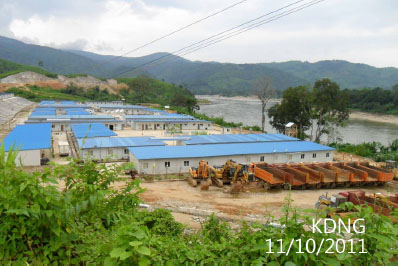The Kachin Development Network Group claim in a media statement released on October 14 that all work on the Myitsone dam project has not stopped as surveys are still been carried out and equipment and supplies are still being delivered.
A spoke person for KDNG, Ah Nan, said land surveys are still being carried out at construction site 7 on the southern part of the dam project.

Ah Nan spoke to Karen News and said that the Kachin Development Network Group wants an official cancellation from the China Power Investment Corporation.
“Work on the dam project infrastructure is still ongoing, we don’t believe in the [government’s] suspension anymore. If the project is to be genuinely suspended, the China Company will also have to issue an official statement for the suspension, and then we can believe it.”
KDNG also pointed out that nothing has really changed as equipment such as bulldozers, trucks and a cement-making plant, company workers and security measures are still going ahead as before.
The KDNG press release stated that the destructive gold mining in the planned Myitsone dam reservoir area is ongoing and the local Kachin villagers have yet to see evidence the project will be stopped and are scared and uncertain about their future.
A local villager from the dam site quoted in KDNG’s press release said.
“We do not trust what the [government’s] President said about suspending the Myitsone dam; we can see workers and dam construction machines still at the site.”
Ah Nan confirmed that the Kachin Development Network Group would continue to fight for the entire seven dams in the area to be stopped.
“All the seven dams in the Irrawaddy project will have devastating effects on the millions of people living along the river. We will continue to oppose the dams until they are all officially cancelled.”
China and Burma reached an agreement in 2005 on the Myitsone dam project that will produce 13,360 megawatts of electricity. China intends to invest US$20 billion on the Myitsone dam project - it is one of China’s biggest investments in Burma.



